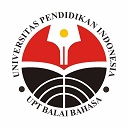CONTRASTIVE ANALYSIS OF REFUSAL EXPRESSIONS IN JAPANESE AND BAHASA AT WORKPLACE
Abstract
Keywords
Full Text:
FULLTEXT PDFReferences
Azis, E.Aminudin. (2008). Aspek-aspek Budaya yang Terlupakan dalam Praktek Pengajaran Bahasa Asing. Proceeding.
Beebe, L., Takahashi, T., Robin Uliss-Weltz(1990). Pragmatic Transfer in ESL refusals.Developing Communicative Competence in a Second Language. New York: Newbury House
Blum-Kulka.S.,&Olshtain.E. Request and Apologies: A Cross-Cultural Study of Speech Act Realization Patterns
Blum-Kulka.S.,&House J. Cross Cultural and Situational Variation in Requesting Behavior
Brown, P., & Levinson, S. (1987). Politeness: Some Universals in LanguageUsage.Cambridge University Press: Cambridge.
Fujiwara, Chiemi. (2004). Nihongo washa to Indonesia go bogo washa no kotowari ni kansuru kenkyuu. Unpublished thesis.
Haristiani, Nuria. (2010). Indoneshia go to Nihon go no Shazai Koudou no Taishou Kenkyuu. Unpublished master thesis.
_____________. (2012). Indoneshia go to Nihon go no Koshou no Hikaku-Shazai Bamen ni Mirareru Jishoushi・Taishoushi no Taigu Teki Kinou ni Chakumokushite-, Journal of Society for Interdisiciplinary Science, Vol.11, 19-26
Hayati, Novia. (2013). Analisis Kontrastif Kotowari Hyougen Antara Pembelajar Bahasa Jepang dan Penutur Asli. ASPBJI Jabar Proceeding, 1-17
Itou, Emiko. (2008). Irai bamen ni mirareru kotowari hyougen no tokuchou: Nihongo, Jawa go, Indonesia go, Mareshia go, Thai go no hikaku, 35-44
Lee, Haiyan. (2013). Kotowari Hyougen no Nicchu Taisho Kenkyuu. Unpublished desertation.
Meng,Yun. (2010). Nichuu Kotowari Ni okeru Poraitonesu Sutoratejii no Kousatsu-Nihon Jin Kaishain to Chuugoku jin kaishain no Hikaku wo Toushite-, Ibunka Komunikeeshon kenkyuu. Vol.22, 1-24
DOI: https://doi.org/10.17509/japanedu.v3i2.13501
Refbacks
- There are currently no refbacks.
Copyright (c) 2018 JAPANEDU: Jurnal Pendidikan dan Pengajaran Bahasa Jepang

This work is licensed under a Creative Commons Attribution-ShareAlike 4.0 International License.
 Published by:
Published by: Department of Japanese Language Education, Faculty of Language and Literature Education
Universitas Pendidikan Indonesia
 Online ISSN: Online ISSN:2528-5548 |

JAPANEDU: Jurnal Pendidikan dan Pengajaran Bahasa Jepang (e-ISSN:2528-5548) lisenced under a Creative Commons Attribution-ShareAlike 4.0 Internasional (CC BY-SA 4.0)


